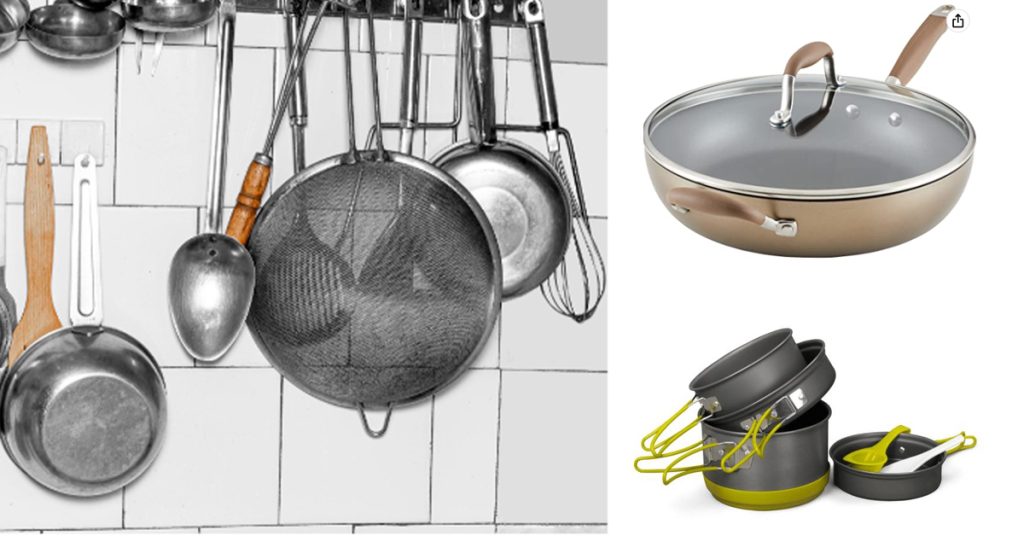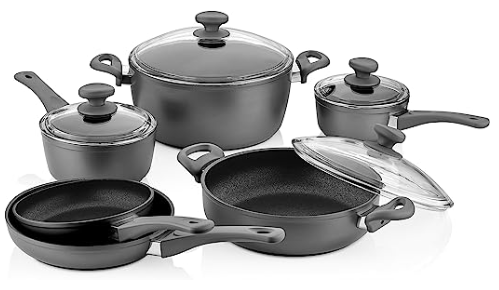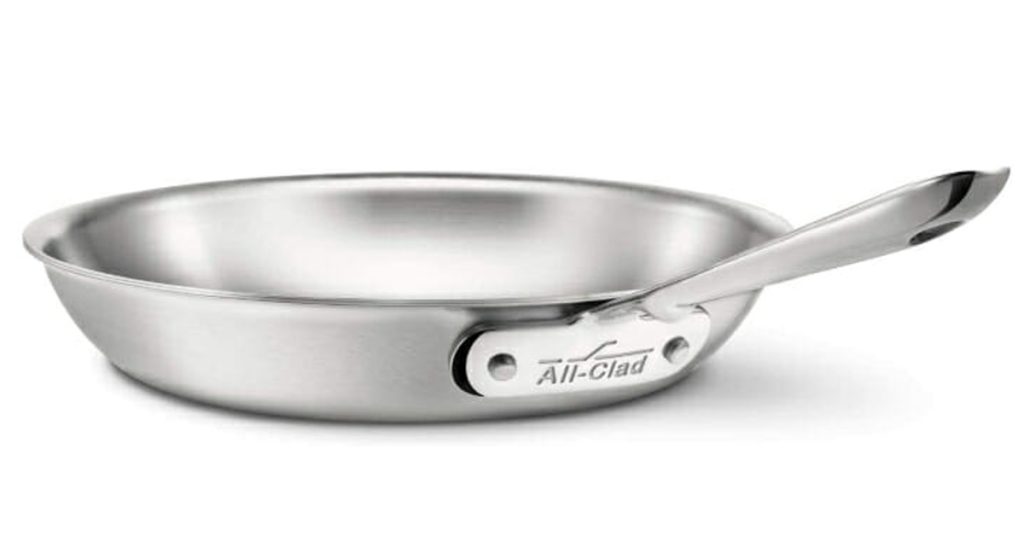As an Amazon Associate, I earn from qualifying purchases
Introduction
Welcome to our comprehensive guide comparing titanium cookware vs stainless steel cookwareBoth materials boast unique attributes that cater to diverse culinary needs.

This in-depth comparison aims to shed light on the distinctive characteristics of titanium and stainless steel cookware, offering valuable insights to aid in selecting the most suitable option.
From heat conductivity and durability to maintenance and cost, this analysis will explore the key aspects, enabling you to make an informed decision and elevate your cooking experience to new heights.
Among the myriad of choices available, two materials that stand out for their durability and cooking performance are titanium and stainless steel.
Both these materials have their unique strengths and features that cater to the needs of various cooking enthusiasts.
In this comprehensive comparison of titanium cookware and stainless steel, we will delve into their individual characteristics, benefits, and drawbacks
So, let’s embark on a journey to unravel the nuances of titanium cookware versus stainless steel and discover which one takes center stage in your kitchen.
Understanding Titanium Cookware

Titanium cookware, a product of blending titanium with metals like aluminum or vanadium, showcases exceptional corrosion resistance and an impressive strength-to-weight ratio, rendering it a perfect choice for culinary purposes.
While the cost of titanium cookware is generally higher compared to other types, its unmatched properties make it a worthwhile investment that promises longevity and reliability for a lifetime of cooking adventures.
Understanding Stainless Steel Cookware

Stainless steel cookware stands out as a metal cooking utensil crafted from a blend of steel and chromium.
Its appeal lies in its remarkable durability, resistance against corrosion, and hygienic properties.
Versatility is another virtue, as it caters to an array of cooking methods, such as boiling, sautéing, frying, and baking.
One noteworthy characteristic of stainless steel cookware is its non-reactive nature, which ensures that it does not alter the flavor of food or trigger any unfavorable reactions.
This quality, along with its ability to endure high temperatures and repetitive use, makes it a preferred choice in camping and commercial kitchens alike.
Among the esteemed stainless steel cookware manufacturers, Nicety leads the way, offering customized solutions to match individual needs while keeping environmental sustainability at the core of their manufacturing process.
Pros and Cons of Titanium Cookware
Pros:
- Easy to handle and Lightweight
- Excellent heat conductivity.
- Non-reactive and Corrosion-resistant.
- Highly durable and long-lasting.
- Requires less oil for cooking.
- Retains heat well.
Cons:
- Expensive compared to other cookware materials.
- Limited variety of designs and styles.
- Not suitable for high-heat cooking methods.
Pros and Cons of Stainless Steel Cookware
Pros:
- Exceptional durability and longevity.
- Versatile and suitable for various cooking methods.
- Non-reactive and safe for acidic ingredients.
- Easy to clean and maintain.
Cons:
- Poor heat conductivity.
- Prone to staining and discoloration.
- Relatively heavy compared to other materials.
Key Differences Between Titanium and Stainless Steel Cookware
When comparing titanium and stainless steel cookware, several key differences set them apart.
When faced with the decision between titanium and stainless steel camp cookware, understanding the differences between these materials is crucial. Below, you will find a comparison of stainless steel vs. titanium cookware to help determine which option is right for you.
Durability:
Titanium cookware surpasses stainless steel cookware in terms of durability. Titanium is significantly harder than stainless steel, boasting almost twice the hardness. This attribute makes titanium cookware less prone to dents and damage over time.
Weight:
Both titanium and stainless steel are popular choices for cookware, but they differ significantly in weight. Titanium is notably lighter than stainless steel, making cookware easier to handle and reducing fatigue during use.
Heat Conductivity:
In terms of heat conductivity, stainless steel, and titanium cookware are relatively similar. Both materials can withstand higher temperatures without warping or sustaining da
Maintenance and Cleaning
Titanium cookware is low-maintenance, requiring minimal effort to clean.
Its non-stick properties reduce the need for excessive oil or butter during cooking.
Stainless steel cookware is also easy to clean, but it may require more effort to remove food residues and prevent sticking. mage provides consistent and reliable cooking performance.
Heat Conductivity and Distribution
Titanium cookware exhibits excellent heat conductivity, ensuring even heat distribution across the cooking surface. In contrast, stainless steel has poor heat conductivity, often leading to hot spots and uneven cooking.
Durability and Longevity
Both titanium and stainless steel are known for their durability, but titanium cookware takes the lead in terms of strength-to-weight ratio. It is highly resistant to scratches, dents, and warping. Stainless steel is also durable, but it may show signs of wear over time.
Health and Safety Considerations
Titanium and stainless steel are generally used in medical implants due to their biocompatibility.
However, specific grade selection and consideration of individual patient factors are essential to ensure the best possible outcome.
Corrosion in Harsh Environments: While both materials are corrosion-resistant, it’s crucial to select the appropriate grade for the specific environment to prevent premature failure.
Allergic Reactions: Although titanium is generally well-tolerated, some individuals might still have allergic reactions to titanium implants.
In the case of stainless steel, nickel content can cause allergic reactions in sensitive individuals.
Fire Hazards: Titanium and stainless steel have different thermal conductivities, so their behavior during welding or in fire conditions may vary.
Proper safety protocols should be followed when working with either material.
When utilizing these materials, it’s vital to consider the application, environment, and individual factors to ensure optimal performance and safety.
Cooking Performance and Versatility
Titanium cookware is outstanding in heat conductivity, making it ideal for quick and precise cooking.
It performs exceptionally well for recipes that require temperature control.
On the other hand, Stainless steel cookware gives versatility, and accept you to cook a wide range of dishes with consistent results.
Subtitle for this block
F A Qs
Titanium Cookware vs Stainless Steel
Titanium cookware excels in terms of heat conduction, heating up quickly and distributing heat evenly across the surface.
Titanium cookware is highly resistant to scratches, making it ideal for everyday use.
Not all titanium cookware is compatible with induction stovetops.
Look for specific models labeled as induction-friendly if you plan to use them on an induction cooktop.
Conclusion
In conclusion, the debate between titanium cookware and stainless steel has shed light on the unique qualities and advantages each material brings to the kitchen.
Both have their merits and drawbacks, making the choice ultimately dependent on individual preferences, cooking habits, and budget considerations.
Titanium cookware stands out for its exceptional lightweight design and excellent heat conductivity, making it ideal for those seeking easy handling and quick, even cooking.
Additionally, its non-reactive surface ensures that flavors remain untainted, providing a pure culinary experience.
Its robust nature makes it a reliable companion for years to come, capable of withstanding the rigors of daily cooking.
Furthermore, stainless steel’s versatility in cooking various types of food and its compatibility with different stovetop types contribute to its popularity among home chefs.
For those who value lightweight cookware, even heat distribution, and a non-reactive cooking surface, titanium cookware emerges as a compelling option.
Meanwhile, those seeking long-lasting durability, versatility, and a more budget-friendly option might find stainless steel cookware to be their best fit.
Ultimately, whether one opts for the modern appeal of titanium or the timeless reliability of stainless steel, investing in high-quality cookware will undoubtedly elevate the cooking journey.
When making your decision, consider factors such as heat conductivity, durability, maintenance, health considerations, price, and cooking performance.
Happy cooking!
To know more details you can also visit our site. If you have any questions on this site, please let me know in the comments